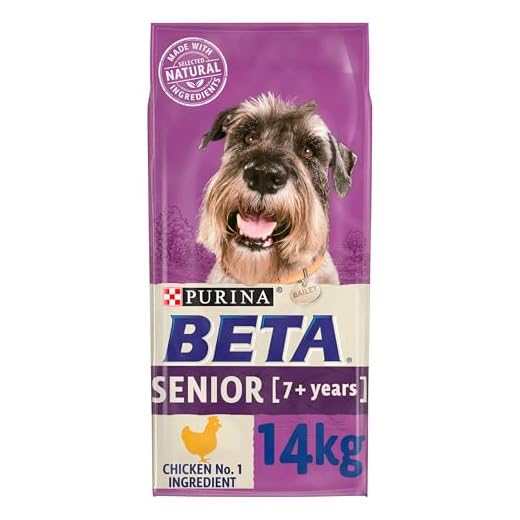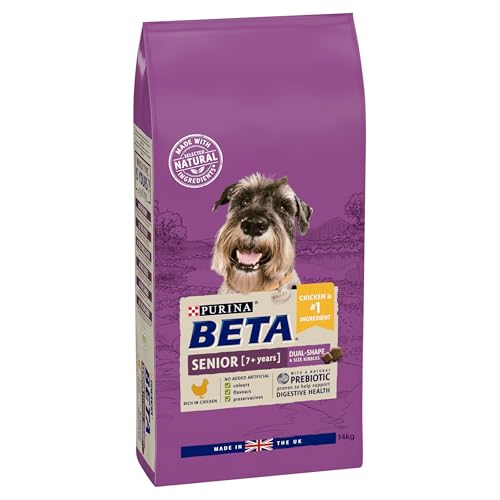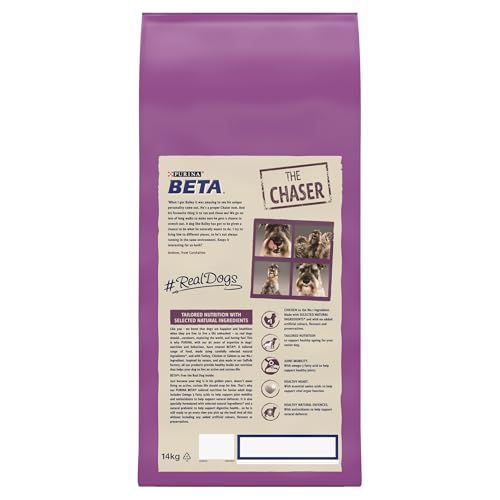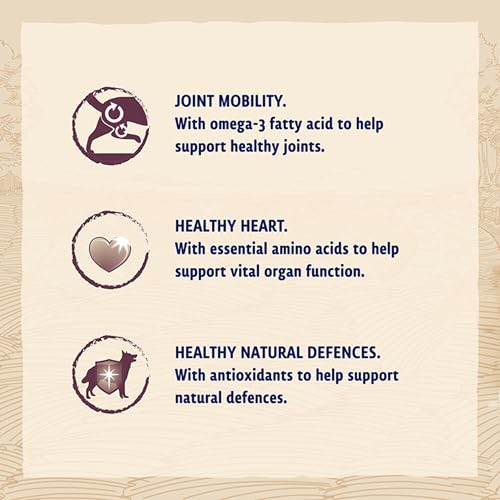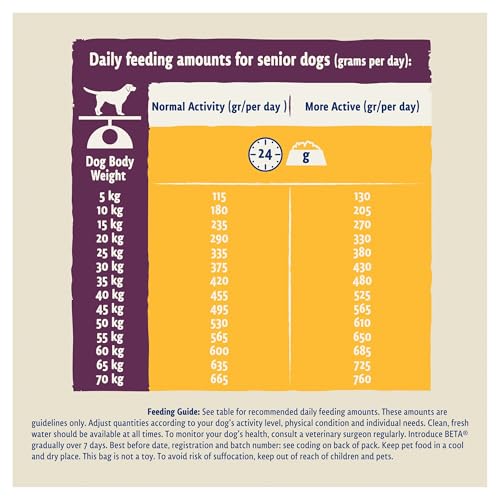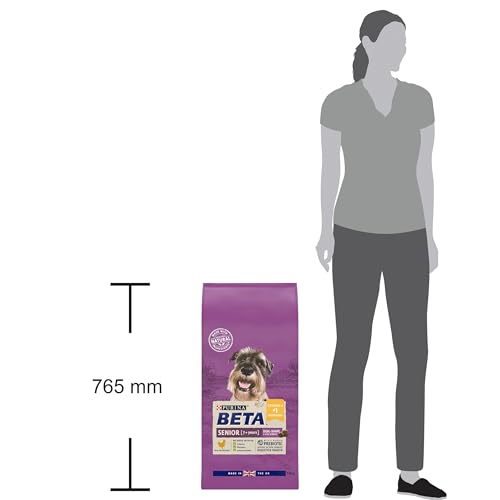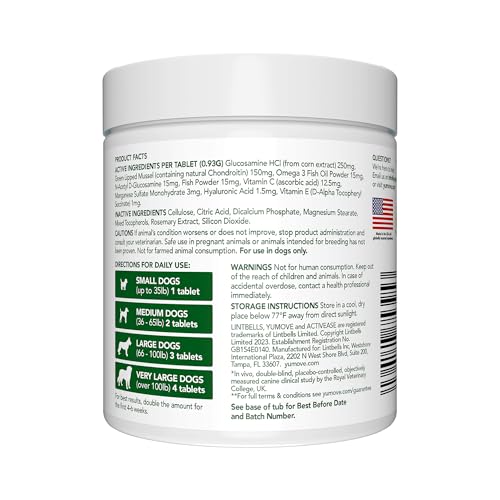




As a dedicated dog owner, I’ve always strived to provide the best for my furry companion. Watching my dog grow older, I’ve noticed the inevitable changes that come with age, particularly joint problems. It’s heart-wrenching to see my once-energetic friend struggle with mobility issues, but I’ve discovered that the right diet can make a world of difference.
Choosing the best dog food for senior dogs with joint problems is not just about picking any high-quality brand. It requires a deep understanding of the specific nutritional needs that can support joint health and overall wellbeing in older dogs. After extensive research and consultations with veterinarians, I’ve come to realise that certain ingredients and supplements are crucial in alleviating joint pain and improving mobility.
In this article, I’ll share my journey of finding the most effective dog foods for senior dogs with joint issues. From the importance of glucosamine and chondroitin to the benefits of omega-3 fatty acids, I’ll detail what to look for in a dog food label. Additionally, I’ll highlight some of the top-rated products that have proven beneficial for my dog and others, ensuring they lead a more comfortable and active life.
My goal is to provide you with comprehensive, actionable information so that you can make informed decisions for your senior dog’s diet. By focusing on the right nutritional elements, we can help our beloved pets enjoy their golden years with less pain and more joy.
Understanding Joint Problems in Senior Dogs
As our dogs grow older, they often face a variety of health challenges, and joint issues are among the most common. Recognising the signs of joint problems early can help us take appropriate steps to ensure our beloved pets remain comfortable and active in their golden years.
Joint problems in senior dogs typically manifest as stiffness, limping, or a reluctance to engage in activities they once enjoyed. These symptoms are often the result of conditions like arthritis, hip dysplasia, or other degenerative joint diseases. It’s important to monitor these signs and consult with a veterinarian for a proper diagnosis and treatment plan.
Causes of Joint Issues in Elderly Dogs
There are several reasons why older dogs might develop joint problems. One of the primary causes is the natural wear and tear on the joints over time. Just as humans experience a decrease in joint health as they age, dogs also suffer from the gradual breakdown of cartilage, leading to pain and reduced mobility.
Another significant factor is breed predisposition. Certain breeds are more prone to joint issues due to their genetics. For instance, large breeds like German Shepherds and Labradors are more likely to develop hip and elbow dysplasia. Additionally, obesity can exacerbate joint problems as the excess weight places additional stress on the joints, accelerating their deterioration.
Recognising Symptoms of Joint Problems
- Stiffness or difficulty rising from a lying position
- Limping or favouring one leg
- Decreased activity or reluctance to play and exercise
- Visible discomfort or pain when touching joints
- Swollen or tender joints
It is crucial to keep an eye on these symptoms and consult with a veterinarian who can recommend appropriate treatments. These might include medications, supplements, or lifestyle changes designed to alleviate pain and improve joint function.
Ultimately, understanding and addressing joint problems in senior dogs can significantly enhance their quality of life. By providing them with the right care, nutrition, and medical attention, we can help our furry friends stay happy and active well into their senior years.
Key Nutrients for Joint Health in Senior Dogs
As our canine companions age, maintaining their joint health becomes a crucial aspect of their overall well-being. It’s essential to understand which nutrients play a vital role in supporting joint function and mobility in senior dogs. By incorporating these key elements into their diet, we can help alleviate discomfort and promote a more active, pain-free lifestyle.
Providing a balanced diet rich in specific nutrients can significantly improve joint health in older dogs. Here are some of the most important nutrients that should be included in their food to support joint health and reduce inflammation.
Essential Nutrients for Joint Health
Let’s delve into the critical nutrients that are beneficial for maintaining joint health in senior dogs:
- Glucosamine and Chondroitin: These two compounds are fundamental for the repair and maintenance of cartilage. Glucosamine aids in the formation of joint lubricants and shock absorption, while chondroitin helps prevent cartilage breakdown.
- Omega-3 Fatty Acids: Found in fish oil, these fatty acids have potent anti-inflammatory properties that can help reduce joint pain and stiffness. They also contribute to overall heart health and cognitive function.
- Antioxidants: Vitamins C and E, as well as other antioxidants, play a crucial role in protecting joint tissues from oxidative damage. They help in neutralising free radicals that can cause inflammation and joint degeneration.
- MSM (Methylsulfonylmethane): This organic sulphur compound is known for its anti-inflammatory and pain-relief properties. MSM supports the formation of connective tissues and can enhance the effects of glucosamine and chondroitin.
- Hyaluronic Acid: This substance is a key component of joint fluid, contributing to the lubrication and cushioning of joints. It helps maintain joint flexibility and reduce discomfort during movement.
By focusing on these nutrients, we can help ensure our senior dogs maintain healthier joints and a better quality of life. Including these elements in their diet, either through specialized dog food or supplements, can make a significant difference in managing joint problems and enhancing their mobility and comfort.
Essential Ingredients in Dog Food for Joint Support
As our beloved furry friends age, they often encounter joint problems that can affect their mobility and overall quality of life. Choosing the right food with the best ingredients is crucial to support their joint health and keep them active and comfortable.
In my experience, I have found that specific ingredients can significantly contribute to improving joint health in senior dogs. Paying attention to these elements in dog food can make a world of difference for our ageing pets.
Key Ingredients to Look For
- Glucosamine and Chondroitin: These two components are often found together and are essential for maintaining healthy cartilage. Glucosamine helps in the formation of cartilage, while chondroitin prevents its breakdown. Including both in your dog’s diet can reduce joint pain and improve mobility.
- Omega-3 Fatty Acids: Found in fish oil and flaxseed, omega-3 fatty acids have anti-inflammatory properties that can alleviate joint inflammation and pain. They are beneficial not just for joint health, but also for the dog’s skin and coat.
- Antioxidants: Vitamins C and E are powerful antioxidants that help combat oxidative stress, which can contribute to joint deterioration. Including antioxidant-rich foods like blueberries and spinach can support overall joint health.
- Hyaluronic Acid: This substance is known for its ability to retain moisture in the joints, promoting lubrication and reducing stiffness. It helps in maintaining the shock-absorbing properties of the joint tissues.
- Green-Lipped Mussel: This unique ingredient from New Zealand is packed with omega-3 fatty acids, glucosamine, and chondroitin. It has been shown to reduce joint pain and improve joint function in dogs.
- Collagen: As a protein that makes up cartilage, supplementing with collagen can support the repair and maintenance of joint tissues. It is particularly useful for dogs with arthritis.
By ensuring these ingredients are part of your senior dog’s diet, you can help them maintain healthier joints and a better quality of life. Always consult with your veterinarian to tailor the best diet plan suited for your pet’s specific needs.
Best Commercial Dog Foods for Senior Dogs with Joint Issues
As our furry companions grow older, they often encounter various health challenges, including joint problems. Ensuring they receive the right nutrition can significantly enhance their quality of life. Selecting an appropriate commercial dog food tailored for senior dogs with joint issues is crucial for managing their condition and maintaining their overall well-being.
Several dog food brands offer specialised formulas that address the unique needs of older dogs with joint concerns. These foods typically include key ingredients such as glucosamine and chondroitin, which are known to support joint health and mobility. Additionally, the best options often contain a balanced mix of protein, fats, and fibres to cater to the dietary requirements of senior dogs.
Key Features of High-Quality Senior Dog Foods for Joint Health
When choosing the right food for your senior dog, consider these essential features:
- Glucosamine and Chondroitin: These compounds are vital for maintaining healthy cartilage and joint function.
- Omega-3 Fatty Acids: Ingredients like fish oil are rich in omega-3s, which have anti-inflammatory properties that can help alleviate joint pain.
- High-Quality Protein: Ensuring your dog receives enough protein helps maintain muscle mass, which supports joint health.
- Antioxidants: Vitamins E and C can help reduce inflammation and support the immune system.
- Balanced Calories: Senior dogs often require fewer calories to prevent obesity, which can exacerbate joint problems.
Some of the standout commercial dog foods for senior dogs with joint issues include:
- Hill’s Science Diet Senior Dog Food: Known for its balanced nutrition, this food contains glucosamine and chondroitin for joint support, along with high-quality protein to maintain lean muscle.
- Royal Canin Size Health Nutrition Maxi Aging 8+: This formula is specifically designed for large breed senior dogs, providing essential nutrients for joint health and overall vitality.
- Purina Pro Plan Senior Dog Food: With added fish oil and antioxidants, this food supports joint health and reduces inflammation, making it a great choice for older dogs.
- Blue Buffalo Life Protection Formula Senior Dog Food: This option includes glucosamine, chondroitin, and omega-3 fatty acids, ensuring comprehensive joint support and balanced nutrition.
In conclusion, selecting the right commercial dog food for your senior dog with joint issues involves looking for specific ingredients that support joint health, maintaining a balanced diet, and choosing brands known for their quality and reliability. Your dog’s comfort and mobility can greatly improve with the proper nutrition, allowing them to enjoy their golden years to the fullest.
Homemade Recipes for Senior Dogs with Joint Issues
As my dog has aged, I’ve become increasingly concerned about his joint health. Watching him struggle with mobility has been tough, and I wanted to ensure his diet supports his well-being. Preparing homemade meals has been a fulfilling way to provide the necessary nutrients to ease his joint discomfort.
Through research and consultation with our vet, I’ve discovered several recipes that are both nutritious and tailored to senior dogs with joint problems. These meals incorporate ingredients known to promote joint health and overall vitality.
Key Ingredients for Joint Support
It’s essential to focus on ingredients that offer anti-inflammatory benefits and support joint health. Some of the key ingredients I’ve found beneficial include:
- Lean Proteins: Chicken, turkey, and fish provide essential amino acids for muscle maintenance.
- Healthy Fats: Fish oil and flaxseed oil are excellent sources of Omega-3 fatty acids, which reduce inflammation.
- Vegetables: Sweet potatoes, carrots, and green beans are rich in antioxidants and vitamins.
- Glucosamine-Rich Foods: Adding bone broth or shellfish can boost glucosamine intake, supporting joint repair.
Recipes for Senior Dogs with Joint Issues
Here are two of my go-to recipes that my senior dog enjoys and have noticeably helped with his joint pain:
- Chicken and Vegetable Stew
- 2 cups of diced chicken breast
- 1 cup of chopped sweet potatoes
- 1/2 cup of carrots
- 1/2 cup of green beans
- 1 tablespoon of fish oil
- 4 cups of low-sodium chicken broth
Instructions: Cook the chicken in a large pot until fully done. Add the sweet potatoes, carrots, and green beans, then pour in the chicken broth. Simmer until the vegetables are tender. Mix in the fish oil just before serving. This stew is packed with nutrients that aid in joint health and is easy for older dogs to digest.
- Salmon and Quinoa Delight
- 1 cup of cooked salmon
- 1 cup of cooked quinoa
- 1/2 cup of spinach
- 1/2 cup of blueberries
- 1 tablespoon of flaxseed oil
Instructions: Combine the cooked salmon and quinoa in a bowl. Add the chopped spinach and blueberries. Drizzle with flaxseed oil before serving. This dish is rich in Omega-3 fatty acids and antioxidants, promoting a healthy inflammatory response and providing essential vitamins and minerals.
Preparing these meals at home has allowed me to control the quality and freshness of the ingredients, ensuring my senior dog receives the best possible nutrition to support his joint health. Observing his increased mobility and comfort has made the effort well worth it.
Supplements to Enhance Joint Health in Senior Dogs
As our beloved dogs age, maintaining their joint health becomes a top priority. Senior dogs often face joint issues that can significantly impact their quality of life. To help them stay active and comfortable, it’s essential to consider adding specific supplements to their diet. These supplements can provide the necessary support to keep their joints healthy and reduce the discomfort associated with ageing.
There are various supplements on the market that can aid in improving joint function and alleviating pain in older dogs. Understanding which ingredients to look for and how they work can help you make an informed decision for your furry friend’s well-being.
Key Supplements for Joint Health
- Glucosamine: This is a natural compound found in cartilage, which cushions the joints. Adding glucosamine to your dog’s diet can help to rebuild and maintain cartilage, providing relief from joint pain and improving mobility.
- Chondroitin: Often paired with glucosamine, chondroitin helps to prevent cartilage breakdown and promotes water retention in the cartilage, enhancing its shock-absorbing properties. This supplement is crucial for slowing down the progression of joint damage.
- Omega-3 Fatty Acids: Found in fish oil, omega-3 fatty acids have anti-inflammatory properties that can help to reduce joint inflammation and pain. These fatty acids are also beneficial for your dog’s overall health, including skin and coat condition.
- MSM (Methylsulfonylmethane): This organic sulfur compound has been shown to reduce inflammation and pain in joints. MSM can improve joint flexibility and reduce swelling, making it easier for your dog to move around comfortably.
- Hyaluronic Acid: This substance helps to lubricate and cushion the joints. By maintaining synovial fluid, it ensures smooth and pain-free joint movement. Supplementing with hyaluronic acid can be particularly beneficial for dogs with severe arthritis.
It’s important to consult with your veterinarian before adding any new supplements to your senior dog’s diet. They can provide guidance based on your dog’s specific health needs and ensure that the supplements will not interact negatively with any medications your dog may be taking. With the right combination of supplements, you can help your senior dog enjoy a more active and comfortable life.
Tips for Transitioning Your Senior Dog to Joint-Friendly Food
When it comes to transitioning your senior canine companion to a diet that supports joint health, there are several considerations to keep in mind. As a responsible pet owner, I’ve learned a few tips that can help make this transition as smooth as possible for my furry friend.
First and foremost, it’s essential to introduce the new joint-friendly food gradually. Abrupt changes in diet can upset a dog’s stomach and lead to digestive issues. To avoid this, I recommend mixing a small amount of the new food with their current food and gradually increasing the proportion of the new food over the course of several days.
- Monitor their response: Pay close attention to how your senior dog responds to the new food. Look for any signs of gastrointestinal upset or allergic reactions. If you notice any adverse effects, consult with your veterinarian to determine the best course of action.
- Consider the texture: Senior dogs with joint problems may have difficulty chewing or swallowing certain types of food. Opt for a joint-friendly formula that is easy for your dog to eat, such as wet food or kibble specially designed for seniors.
- Supplement wisely: In addition to switching to a joint-friendly diet, consider incorporating supplements such as glucosamine and chondroitin into your dog’s daily routine. These supplements can help support joint health and alleviate symptoms of arthritis and other joint problems.
- Stay consistent: Once you’ve successfully transitioned your senior dog to joint-friendly food, it’s important to stick with it. Consistency is key when it comes to maintaining the health and well-being of your furry companion.
Common Mistakes to Avoid When Feeding Senior Dogs with Joint Problems
Feeding a senior dog with joint problems requires careful attention and consideration. Avoiding common mistakes can contribute to your dog’s overall well-being and quality of life. Here are some key points to keep in mind:
Avoiding Imbalance in Nutritional Needs
1. Overfeeding: While you may want to pamper your senior dog, overfeeding can lead to obesity, exacerbating joint issues. Consult your vet to determine the appropriate portion size for your dog’s age, size, and activity level.
2. Underfeeding: On the flip side, underfeeding can deprive your senior dog of essential nutrients needed to support joint health. Ensure their diet is balanced and provides adequate protein, vitamins, and minerals.
Neglecting Special Dietary Requirements
3. Ignoring Joint-Specific Formulas: Not all dog foods are created equal. Look for formulas specifically designed for senior dogs with joint problems, as they often contain ingredients like glucosamine and chondroitin to support joint health.
4. Lack of Hydration: Dehydration can worsen joint pain. Always provide fresh water for your senior dog, and consider moistening their food to increase water intake.
Disregarding Individual Preferences and Sensitivities
5. Failing to Consider Texture Preferences: Some senior dogs may struggle with crunchy kibble due to dental issues or jaw pain. Experiment with different textures, including wet or soft foods, to find what your dog prefers.
6. Ignoring Food Sensitivities: Certain ingredients may exacerbate joint inflammation or cause allergic reactions in some dogs. Pay attention to how your dog reacts to different foods, and choose options that agree with their digestive system and overall health.
Summary
Feeding a senior dog with joint problems requires a tailored approach that considers their nutritional needs, dietary requirements, and individual preferences. By avoiding common mistakes such as overfeeding, neglecting specialized formulas, and disregarding sensitivities, you can help support your dog’s joint health and enhance their overall quality of life.
Best Dog Food For Senior Dogs With Joint Problems
Features
| Part Number | 12231689 |
| Model | 12531980 |
| Color | transparent |
| Release Date | 2014-05-23T00:00:01Z |
| Size | 1 count (Pack of 1) |
Features
| Part Number | GR00142212 |
| Model | 195511/3854 |
| Color | transparent |
| Release Date | 2015-03-30T00:00:01Z |
| Size | 10 kg (Pack of 1) |
| Language | English |
| Price history for Grain-Free Salmon & Sweet Potato Food | |
|---|---|
|
Latest updates:
|
|
Features
| Part Number | YMS120 |
| Model | YMS120 |
| Warranty | 2 year Manfacturer |
| Color | White |
| Size | 120 Tablets |
Features
| Part Number | B00481D75M |
| Model | BSR12 |
| Color | Golden Years |
| Is Adult Product | |
| Release Date | 2011-06-01T00:00:01Z |
| Size | 12 kg (Pack of 1) |
| Language | English |
| Price history for Natural Senior Dog Recipe with Joint Support | |
|---|---|
|
Latest updates:
|
|
Features
| Part Number | 29046 |
| Model | 02SKFTLS |
| Warranty | 1 year manufacturer |
| Size | 1 count (Pack of 1) |
| Language | English |
| Price history for Light & Senior Dry Dog Food | |
|---|---|
|
Latest updates:
|
|
Features
| Part Number | JSYA |
| Model | JSYA |
| Size | 300 Tablets |
| Language | French |
Features
| Size | 300 g (Pack of 1) |
Features
| Part Number | 12381793 |
| Model | 12381793 |
| Size | 1 count (Pack of 1) |
| Language | Spanish |
| Price history for Joint Mobility Support Dry Food | |
|---|---|
|
Latest updates:
|
|
Q&A:
What should I consider when choosing food for my senior dog with joint problems?
When choosing food for your senior dog with joint problems, consider options with glucosamine and chondroitin, which support joint health. Look for formulas with reduced calories to maintain a healthy weight and ease pressure on joints.
Are there specific ingredients I should look for in dog food for senior dogs with joint issues?
Yes, look for ingredients like omega-3 fatty acids, which have anti-inflammatory properties and can help alleviate joint pain. Also, foods containing antioxidants such as vitamin E and C can aid in reducing inflammation and supporting overall joint health.
Can senior dog food help improve mobility in dogs with joint problems?
Absolutely, specially formulated senior dog foods often contain ingredients like glucosamine and chondroitin, which are known to promote joint health and improve mobility in dogs with joint problems.
How can I ensure my senior dog maintains a healthy weight while addressing joint issues?
To help your senior dog maintain a healthy weight while addressing joint issues, choose a dog food with reduced calories but still rich in essential nutrients. Additionally, regular exercise appropriate for their condition can aid in weight management and improve joint function.
Are there any foods I should avoid feeding my senior dog with joint problems?
Avoid foods high in fillers, artificial additives, and excessive carbohydrates, as these can contribute to inflammation and exacerbate joint issues. Additionally, steer clear of foods with high levels of fat, which can lead to weight gain and put further strain on the joints.

